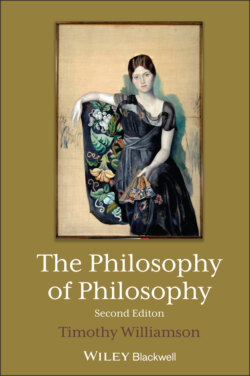Читать книгу The Philosophy of Philosophy - Timothy Williamson - Страница 10
Preface to the First Edition
ОглавлениеThis book grew out of a sense that contemporary philosophy lacks a self-image that does it justice. Of the self-images that philosophy inherited from the twentieth century, the most prominent – naturalism, the linguistic turn, post-modern irony, and so on – seemed obviously inadequate to most of the most interesting work in contemporary philosophy: as descriptions, false when bold, uninformative when cautious. Less prominent alternatives too seemed implausible or ill-developed. Although an adequate self-image is not a precondition of all virtue, it helps. If philosophy misconceives what it is doing, it is likely to do it worse. In any case, an adequate self-image is worth having for its own sake; we are not supposed to be leading the unexamined life. This is my attempt to do better.
I considered using the phrase “philosophical method” in the title, but decided against on the grounds that it seemed to promise something more like a recipe for doing philosophy than I believe possible. When asked for advice on some occasion, the Duke of Wellington is said to have replied “Sir, you are in a devilish awkward predicament, and must get out of it as best you can.” My advice would be scarcely more useful. At the crucial point, I can only say “Use your judgment.” The primary task of the philosophy of science is to understand science, not to give scientists advice. Likewise, the primary task of the philosophy of philosophy is to understand philosophy, not to give philosophers advice – although I have not rigorously abstained from the latter.
I also rejected the word “metaphilosophy.” The philosophy of philosophy is automatically part of philosophy, just as the philosophy of anything else is, whereas metaphilosophy sounds as though it might try to look down on philosophy from above, or beyond. One reason for the survival of implausible self-images of philosophy is that they have been insufficiently scrutinized as pieces of philosophy. Passed down as though they were platitudes, they often embody epistemologically or logically naïve presuppositions. The philosophy of philosophy is no easier than the philosophy of science. And like the philosophy of science, it can only be done well by those with some respect for what they are studying.
The book makes no claim to comprehensiveness. For example, it does not engage in detail with critics of analytic philosophy who do not engage with it in detail. I preferred to follow a few lines of thought that I found more rewarding. I hope that philosophy as I have presented it seems worth doing and not impossibly difficult. At any rate, I enjoy it.
